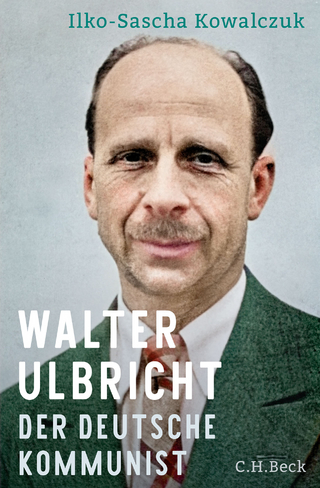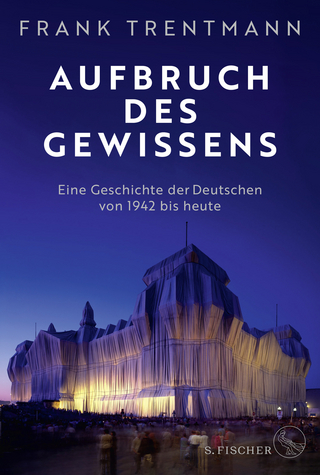
Texts and Contexts from the History of Feminism and Women’s Rights
Central European University Press (Verlag)
978-963-386-453-1 (ISBN)
The book is organised around themes instead of countries; the similarities and differences between nations are nevertheless pointed out. The editors consider women not only in their local context, but also in conjunction with other systems of thought—including shared agendas with socialism, liberalism, nationalism, and even eugenics.
The choice of texts seeks to demonstrate how feminism as political thought was shaped and organised in the region. They vary in type and format from political treatises, philosophy to literary works, even films and the visual arts, with the necessary inclusion of the personal and the private. Women’s political rights, right to education, their role in nation-building, women, and war (and especially women and peace) are part of the anthology, alongside the gendered division of labour, violence against women, the body, and reproduction.
Zsófia Lóránd is an intellectual historian of feminism in post-WWII state-socialist Eastern Europe. Jovana Mihajlović Trbovc is a political scientist dealing with political issues from the perspective of culture studies. Katarzyna Stańczak-Wiślicz is a social historian working in the Institute of Literary Research, Polish Academy of Sciences.
Introduction
1. The legacy of the pre-1945 period
● Ecaterina Arbore, The Working Woman in the Struggle towards Emancipation, 1911 (Romania)
● Žemaitė (Julija Beniuševičiūtė-Žymantienė), To the Enemies of Women’s Equality, 1912 (Lithuania)
● Rosika Schwimmer, The Grievances of Feminism under the Proletarian Dictatorship, 1919 (Hungary)
● Mariska Gárdos, On Sexuality, Prostitution, and Feminism, 1906 and 1941 (Hungary)
● Shaqe Marie Çoba, On Feminism, 1921 (Albania)
● Johanna Päts, Why Must Women Elect Women to Parliament?, 1932 (Estonia)
● Irena Krzywicka, The Fall of Male Civilization, 1932 (Poland)
● Halina Krahelska, The Roots of Changing Sexual Mores, 1937 (Poland)
● Angela Vode, The Woman in Contemporary Society, 1934 (Yugoslavia/Slovenia)
2) Women and war
● Žena danas Editorial Board, The New Feminism, 1936 (Yugoslavia/Serbia)
● Ina Jun-Broda, Two Poems by a Partizanka, 1943/44 (Yugoslavia)
● Maca Gržetić, Report on Women in the People’s Liberation Struggle, 1945 (Yugoslavia/Croatia)
● Romanian Workers Party, Fallen in Battle: Olga Bancic, 1949 (Romania)
● Lina Kostenko, A Female Poetic Voice against Totalitarianism and War, 1957, 1962, 1987 (Ukraine/USSR)
● Staša Zajović, Antiwar Activism in Serbia, 1996 (Serbia)
● Śviatłana Aleksijevič, What is Our Memory?, 1998 (Belarus)
3) Ideologies of women’s emancipation
● Hana Gregorová, About 8th March and Feminism, n.d. (Slovakia/ Czechoslovakia)
● Anna Kéthly, Women in Politics, 1945 (Hungary)
● Milada Horáková, Women in Politics, 1945 (Czechia/Czechoslovakia)
● Dušanka Kovačević and Razija Handžić, On Lifting Veils on Muslim Women, 1940s (Yugoslavia/Serbia and Bosnia and Herzegovina)
● Martha Arendsee, The Right to Motherhood, 1946 (GDR)
● Edwarda Orłowska, Paper Delivered at the Plenary Meeting of the Main Board of the League of Women, January 12th,1949, 1949 (Poland)
● Aina Jurciņa, The Consequences of Emancipation?: Theoretical Findings, 1980 (Latvia)
● Lydia Sklevicky, The Antifascist Front of Women as a Potential Factor in the Process of Cultural Change, 1985 (Yugoslavia/Croatia)
● Nada Ler-Sofronić, Marxism and Neofeminism, 1986 (Yugoslavia/Bosnia and Herzegovina)
● Drita Bakija Gunga, The Women of Kosovo in the Period of Socialist Construction: 1945-1978, 1986 (Yugoslavia/Kosovo)
4) The international aspects of women's rights
● German Democratic Women’s League, “The First German Women’s Delegation to Stockholm”, 1947 (GDR)
● Call of the Tukums District Female Activists to District Women on the Decisions of the World Congress of Women in Copenhagen, 1953 (USSR, Latvia)
● Mitra Mitrović, The Woman’s Position in the Contemporary World, 1960 (Yugoslavia/Serbia)
● Rózsa Ignácz, Connections to Distant Women through Travelogues, 1968 (Hungary)
● Esma Redžepova, Songs by a Yugoslav Romani Vocal Icon, 1961-1987 (Yugoslavia/Macedonia)
● Vida Tomšič, On the Question of Women’s Social Position in the Contemporary World, 1976 (Yugoslavia/Slovenia)
● Marija Gimbutas, An Interview about Prehistoric Matriarchy, 1981 (Lithuania)
● Elena Lagadinova, Statement at the Nairobi Conference, 1985 (Bulgaria)
5) Politicizing motherhood (and fatherhood)
● Maria Skokowska-Rudolfowa, Mother and Child Day, 1946 (Poland)
● Zlata Grebo, Opinions of Rural Women, 1964 (Yugoslavia/Bosnia and Herzegovina)
● Serhii Hryhoriev, Son, 1969 (USSR, Ukraine)
● Alla Horska, Maternity in Ukrainian Dissent, 1960-1964 (USSR, Ukraine)
● Leokadija Diržinskaitė-Piliušenko, Soviet Women, Active Builders of Communism, 1976 (USSR/Lithuania)
● Cristina Nicolae, Two Movies on the Lives of Women Factory Workers in Romania, 1983, 1992 (Romania)
● Júlia Szilágyi, A Spoken World, 1983 (Romania)
● Maria Dinkova and Chavdar Kjuranov, Women, Gender, and the Use of Time in Socialist Bulgaria, 1979 (Bulgaria)
6) Time budgets and double burden
● Libuše Háková, Promoting the Marxist Conception of the Woman Question, 1967 (Czechia/Czechoslovakia)
● Central Council of Polish Trade Unions, The Professional Work of Women and the Family, 1967 (Poland)
● Sonia Bakish, Let’s Cancel the Second Shift, 1967 (Bulgaria)
● Ecaterina Oproiu, Two Key Questions, 1977 (Romania)
● Mileva Filipović, Working Class and Emancipation of a Woman in Socialism, 1979 (Yugoslavia/Montenegro)
● Vizma Belševica, Time Budgets and the Double Burden, 1981 (Latvia)
● Regīna Ezera, Betrayal, 1982 (Latvia)
7) Violence against women and gender based violence
● Blaženka Despot, Feminist Marxism and Violence against Women, 1987 (Yugoslavia/Croatia)
● Frauenteestube Weimar: Our Critique of the Legal Concept of Rape, c. 1987 (GDR)
● Andra Neiburga, Domestic Violence, 1988 (USSR/Latvia)
● Mojca Dobnikar, Feminism and Social Work, 1997 (Yugoslavia/Slovenia)
8) Women in politics
● Júlia Rajk, Christmas Troubles, 1948 (Hungary)
● Tsola Dragoicheva, Eight Years of Equality and Happiness, 1952 (Bulgaria)
● Latinka Perović, Ahead of the Elections, 1963 (Yugoslavia/Serbia)
● Olivia Clătici, On the Social Condition of Women, 1973 (Romania)
● Vera Veskoviḱ-Vangeli, Women in History, 1974 (Yugoslavia/Macedonia)
● Women’s Forum, To the Presidium of the 9th Extraordinary Congress of the Polish United Workers’ Party, 1981 (Poland)
● Ina Merkel, Without Women, There is No State, 1989 (GDR)
9) Reproductive rights and demography
● Maria Jaszczukowa, Proposal on the Criteria of Abortion Permissibility, 1956 (Poland)
● Zsuzsa Körösi, Petition for the Protection of the Freedom of Abortion, 1973 (Hungary)
● Aimee Beekmann, Freedom to Choose, 1978 (Estonia)
● Jasenka Kodrnja, The Diary of a Woman in Labor, 1981 (Yugoslavia/Croatia)
● Ana Blandiana, Children’s Crusade, 1984 (Romania)
● Vlasta Jalušič, Abortion, Women and Politics, 1990 (Yugoslavia/Slovenia)
● Ágnes Geréb, The Circumstances of a 1995 Home Birth Case, 1995 (Hungary)
10) Health and the body
● Katalin Ladik, Performance Art and Marginalization, 1970 (Yugoslavia/Vojvodina)
● Maria Pinińska-Bereś, Is a Woman a Human Being?, 1972 (Poland)
● Anna Świrszczyńska, “I am baba” (selected poems), 1973 (Poland)
● Lepa Mlađenović and Biljana Branković, Alternatives to Psychiatry in Yugoslavia, 1985 (Yugoslavia/Serbia)
● Sanja Iveković, Sweet Violence – Mass Media and Feminist Art in Yugoslavia, 1970s-1980s (Selected art works) (Yugoslavia/Croatia)
11) Sexuality
● Ágnes Heller and Mihály Vajda, Family Structure and Communism, 1970 (Hungary)
● Todor Bostandziev, Sexology—A Belated Conversation, 1970 (Bulgaria)
● Slavenka Drakulić, Women and the Sexual Revolution, 1980 (Yugoslavia/Croatia)
● Radu Dumitriu, Sexology and Sexual Education, 1972 (Romania)
● Erzsébet Galgóczi, I Am the First Woman Writer of Peasant Origin in Hungary, 1975 and 1981 (Hungary)
● Vesna Kesić, Isn’t Pornography Cynical?, 1982 (Yugoslavia/Croatia)
● Suzana Tratnik and Nataša Sukič, The Slovenian Lesbian Movement, 1990 (Yugoslavia/Slovenia)
● The Violet Pulse, Fury the First, 1999s (Poland)
12) Debating “Western“ feminisms
● Nadežda Čačinovič, Equality or Liberation, 1976 (Yugoslavia/Croatia)
● Rada Iveković, The Position of Women: Immediate Tasks and Neglected Aspects, 1978 (Yugoslavia/Croatia)
● Stana Buzatu, Issues for a Fruitful Dialogue Between Feminism and Marxism, 1979 (Romania)
● Žarana Papić, Sex and Gender—Categories of the Social Organization of Sexuality, 1984 (Yugoslavia/Serbia)
● Agate Nesaule, Conversation about The Second Sex, 1991 (Latvia)
● Jiřina Šmejkalová, Pavla Horská, and Jaroslava Pešková, Feminism and the Woman Question at the Time of Transition, 1991 and 1992 (Czechoslovakia/Czechia)
● Barbara Limanowska, Why Is There No Feminism in Poland?, 1993, and Agnieszka Graff: Patriarchy after “Sexmission,” 2001 (Poland)
13) Dissidence
● Nadiia Svitlichna,Women’s Status in Contemporary Ukraine, 1979 and Vira Lisova, Women in the Resistance Movement of the Seventies, 1997 (Ukraine)
● Dije Lohaj, Innocence (A poem from Ilegalja movement), 1980s (Yugoslavia/Kosovo)
● Larysa Hienijuš – Confession, two poems: Belaruska, The Beds of Rivers are Filled with Running Blood and Ivonka Surviłła – The Road (Belarus)
● Jana Juráňová, …Without Context… How Is Feminism Doing in Slovakia?, 1994 (Slovakia)
● Veronika Cherkasova, The Country Just Across the Way, 2004 (Belarus)
14) Transitions
● Dunja Blažević, The Activist of the Avant-Garde, 1982 (Yugoslavia)
● Ágnes Daróczi, Making Gypsiness Bearable, 1984 (Hungary)
● Teuta Arifi, Police and Cooking Recipes. Yugoslav Feminism’s Precarious Solidary with Kosovo, 1991 (Yugoslavia/North Macedonia/Kosovo)
● Irene Dölling, with Adelheid Kuhlmey-Oehlert, Gabriela Seibt and Women in the GDR, “Our Skin” - Women about Autumn 1990, 1992 (GDR)
● Mihaela Miroiu and Laura Grünberg, Breaking the Spell / Feminism as Personal Experience, 1994 and 1996
● Hana Havelková, A Liberal History of the Woman Question in the Czech Lands, 1995 (Czechoslovakia/Czechia)
● Kazimiera Prunskienė, Women’s Party Program, 1996 (Lithuania)
● Nicoleta Bițu, The Romani Women’s Movement in Romania, 1999 (Romania)
| Erscheinungsdatum | 02.05.2024 |
|---|---|
| Verlagsort | Budapest |
| Sprache | englisch |
| Maße | 152 x 229 mm |
| Gewicht | 848 g |
| Themenwelt | Geschichte ► Allgemeine Geschichte ► Zeitgeschichte |
| Geisteswissenschaften ► Geschichte ► Regional- / Ländergeschichte | |
| Geschichte ► Teilgebiete der Geschichte ► Kulturgeschichte | |
| ISBN-10 | 963-386-453-4 / 9633864534 |
| ISBN-13 | 978-963-386-453-1 / 9789633864531 |
| Zustand | Neuware |
| Haben Sie eine Frage zum Produkt? |
aus dem Bereich


